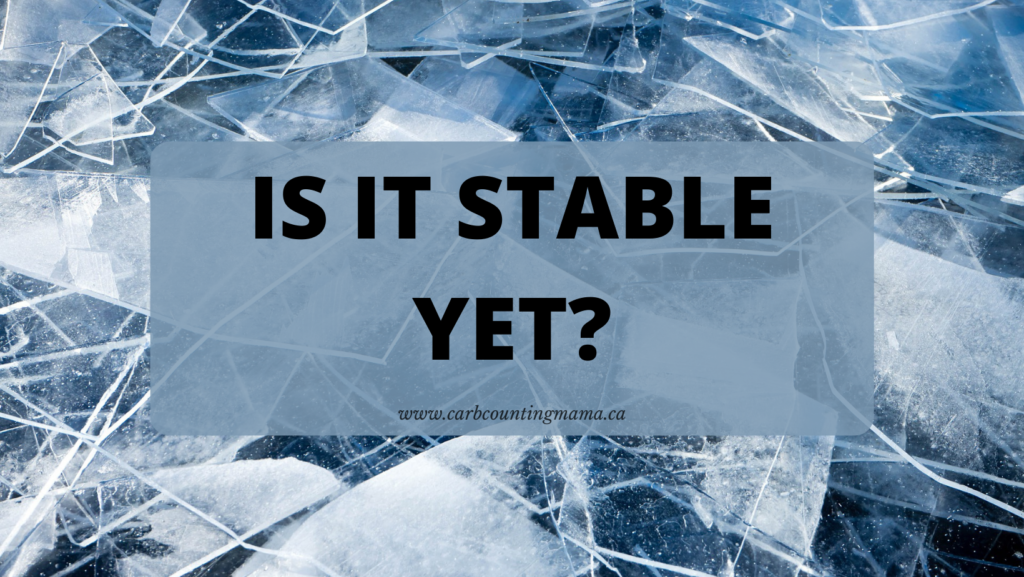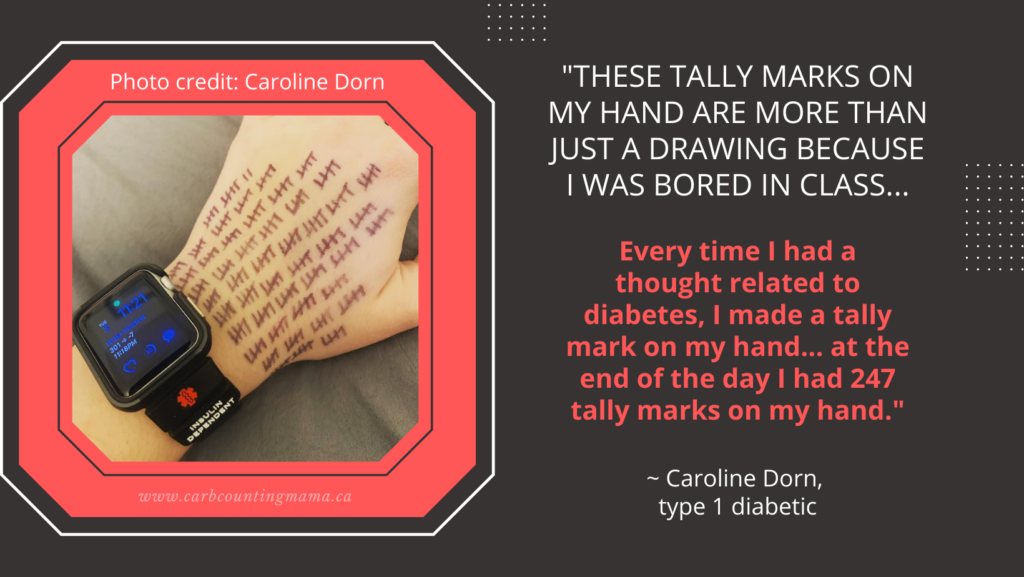This week alone, I’ve had 3 different friends and family members ask me, “How’s Jordan’s diabetes? Is it stable now?” It’s been a while since I’ve gotten this question, but it’s still as frustrating as ever. It’s an impossible question to answer. The thing is, “stable” and “diabetes” simply don’t go together.

I remember very clearly the first time anyone asked me if my son’s type 1 diabetes was stable.
He was in third grade and I was outside his classroom at the end of the school day, waiting with the other parents for the bell to ring.
His elementary school was a community school. Attached to it was a preschool, a daycare, and a community center. Since we had 3 young children, we were at the school a lot. We knew a lot of the staff and they knew us. One of the people who I vaguely knew, who worked in the community center, saw me as he was passing by.
He asked me how we were doing with Jordan’s diabetes. I find that to be a complex question to answer. Not one that I can answer in passing, if at all. It doesn’t really make sense, especially after the initial diagnosis once you find your footing and can do things somewhat “normally” again. So, I usually just answer that question with, “it’s going well.”
Then he asked if he was stable yet. Back then, I didn’t know how to answer that question, and, with what I’m sure was a very confused look on my face, I replied, “no?”
He assured me that it would get stable eventually. That he knows someone who has a child with T1D and it was hard until the child became a teenager, at which point his diabetes stabilized.
I know what you’re thinking. I was thinking the same thing.
But, I didn’t have the time or energy to respond properly. I just smiled and nodded, thanked him, and went to pick up my children from their classes.
If I had had the time
I might have explained that T1D doesn’t become stable. That we had already been at it for over 5 years. That T1D is something you need to be on top of 24/7, no matter how it’s managed.
I could have told him about carb counting and insulin dosing and accounting for activity, illnesses, and growth spurts. That all of those things and more have to be done every single day. That they don’t really get easier, we simply get better at doing it all.
I may have clarified that blood glucose levels are largely affected by hormones. That the teenage years are commonly one of the most difficult phases for T1D management. That I’m sure it looks like his friend’s child’s T1D is stable, but under the surface, I know there is a lot of effort being put into it.
But I didn’t have the time. And it likely wouldn’t have mattered if I did.
Their heart is in the right place
People who don’t live with T1D in their everyday lives don’t understand it. You don’t know what you don’t know. Of course, this is true. I didn’t know anything about T1D before my son was diagnosed. Despite that, I very strongly hope that I never would have asked anyone if their diabetes was stable yet.
The question “is it stable yet?” is the same as asking someone “how are you?”. Most of the time, especially if the person asking is not very close to you, they’re looking for a simple, neutral or positive answer.
“How are you?”
Socially acceptable answers are: Good. Fine. Great… followed by a reciprocal, “How are you?”
It’s a quick greeting. Most people are not looking for a deep, truthful response. But, most of us do have deep, truthful responses to share.
We show people our best selves. Composed and collected. So, even if we’re struggling, we generally respond to that question by hiding our struggles.

“Is it stable yet?”
While on the surface this question seems like it’s heartfelt and caring, if you answer anything other than “yes”, you’ll quickly find that most people are not interested in the real answer.
They want to see the calm. They want to hear that things are going well. Most people don’t want to hear about what’s going on under the surface. About the effort you have to put in every day, just to stay afloat.
Their expression and body language change as a glazed look often comes across their face. They aren’t hearing what you’re saying, which is often demonstrated by the fact that they ask the exact same question the next time you see them.
It’s a lonely feeling
When someone asks “is it stable yet?”
It’s a reminder that that person doesn’t understand. And that they probably don’t want to.
It’s a nonsensical question that has no answer. But that’s the point, isn’t it? To make the conversation turn in a different direction. They’ve done their obligatory check-in, asking about your T1D. Now they can comfortably go back to talking about their life again.
Not everyone is like that, but I think, if you really pay attention, you’ll find that when most people ask if your diabetes is stable, the end goal is usually to get away from diabetes talk. Even when they’re the one who brought it up.
Which is very sad. Because diabetes is hard. We want to have someone to discuss it with. When someone asks about it, it can seem like a glimmer of hope. Someone cares. Someone wants to hear what’s going on.
It’s very sad, to be brushed off if you do start talking about it in an open, honest way.
But even if they do care, it’s a very difficult question to answer
Because T1D doesn’t stabilize. We don’t “control” it.
Some of the factors are predictable. Many can be accounted for. Some are unforeseeable and you constantly need to adjust on the go.
A study at Stanford University found that people with type 1 diabetes make an average of 180 extra decisions a day, every day. Average. Every. Single. Day.
That’s a lot.
And it doesn’t get to a point where you have a set dose. Where it calms down. Ever. Even the calculations that we use change frequently. There is constant testing and tweaking. Correcting and fine-tuning.
It can’t be stable.
Maybe it’s just semantics?
Here’s the big problem with asking if someone’s T1D is stable:
WHAT DOES STABLE MEAN?
Are you asking if their blood glucose numbers are in non-diabetic range? Is it their A1C you’re interested in? Their mental health? Their sleep schedule? Do you want to know what their TIR is?
WHAT DOES STABLE DIABETES LOOK LIKE?
Is it stable if they don’t have to go to the hospital? Or if they aren’t visibly stressed out when they go to a gathering? Is it considered stable if others don’t have to witness injections? Do you think they’ll get off of insulin one day? That it will sort itself out somehow?
Stable is such a vague concept. Why is it such a common question about diabetes?
People don’t ask this about other conditions or diseases. At least, I don’t think they do?
If they do, it sounds just as absurd:
“How’s the depression going? Is it stable yet?”
“How are your allergies? Is it stable yet?”
“How’s the PTSD? Is it stable yet?”
Is it just me? Or do those sound wrong?
So, why diabetes?
Maybe it’s because diabetes involves a lot of numbers. If they’re wildly swinging up and down, it’s not stable. If they’re mostly in range, not spiking and dipping too severely, I suppose that would be stable?
Maybe it’s from TV. Advertisements about T2D medications? I don’t pay attention to commercials, but maybe they claim to stabilize your diabetes?
Maybe it’s from insurance companies. People who don’t understand the disease trying to compartmentalize it. It certainly wouldn’t be the first time insurance companies got involved in things that weren’t their business.
I even chatted briefly with a medical professional who said they ask patients if their diabetes is stable. What they mean by stable is that the patient is seeing a doctor regularly and taking their medications as directed. That’s not even something that comes to mind for me when someone asks if my son’s T1D is stable.
Regardless of how or why it started, it seems that no two people define “stable” the same way.

The hospital discharged you and you’re on insulin now, it must be stable
Lots of people think that being on insulin is some sort of quick fix.
Insulin is unlike almost every other medication. There is no set dose. Every time you eat, you have to do ridiculous diabetes math to figure out how much insulin to give. And it’s often wrong and needs further correction one way or the other. Too high? Add insulin. Too low? Add glucose.
Everyone with T1D is extremely thankful for their insulin. Without it, they would die. But it isn’t a cure. It’s a treatment.
“Type 1 diabetes is the only disease I know of that patients and their caregivers are making dosing decisions of a drug that if you get it really wrong, could kill you – and they are making those decisions 24/7/365.”
~ David Panzirer, Helmsley Charitable Trust
But I know someone who is stable because they eat low carb, you say
Yes, eating a low-carb diet takes away one of the factors. One of the major ones. Fewer carbs means less insulin. That means less room for error.
Some people choose to eat low-carb as part of their T1D management. When I say low-carb, I mean 30 grams or fewer a day. If you’ve ever paid attention to carb counts in what you eat, that means you can’t even eat fruit. 2 apples have approximately 30 grams of carbs in them. It works for some people. But it doesn’t mean their T1D is stable.
They still have to do calculations every day, they’re just slightly different ones. They still have to adjust for activity, hormone fluctuations, illness, and so on.
Make no mistake, people who eat low-carb and have non-diabetic numbers still work to achieve that. They’re trading off making big decisions about insulin for making decisions about food instead. If they stopped, even for a few hours, their numbers would get out of hand quickly.
But my friend uses an insulin pump, so they’re stable, you tell me
Insulin pumps are a lovely tool for lots of people. They mean fewer pokes and smaller doses. You can manipulate the insulin amounts in different ways than you can with manual injections. But, it’s not a set it and forget it tool.
The pump does the math for you, but you still have to provide the correct information. You still have to override its calculation sometimes because you are aware of external factors that it has no way of calculating.
That person is pushing buttons instead of pulling out a syringe, but the effort is the same either way. Insulin pumps are not automatic, yet.
Short of an artificial pancreas or a cure
Neither of which exist yet, there is no way to make T1D stable. Regardless of management methods, lifestyle choices, or how hard you try.
Regardless of which management style or gadgets the person uses, no matter their education level, despite how deeply they immerse themselves in all things T1D… if they stop doing what they’re doing, even for a few hours, they could get very sick, end up in the hospital, or worse.
What’s stable about that?
There are certainly ways to make it easier to manage. Arguably, the best way is to gain as much knowledge as possible about T1D, insulin, food, and exercise. And to figure out how they all work together.
We can find resources that help. And people who support us through this journey.
But it will never be stable.
~ Leah
Have you ever been asked if your T1D is stable yet? What did you say? How did you handle it? Leave a comment below!
For more tips and stories about T1D, join the Carb Counting Mama email list, and make sure to head over to the Carb Counting Mama Facebook page and “like” it.
Thank you for this.
I’m a grandmother who is often asked this question about my granddaughter who has T1D. I”ve shared it with the Type 1 Diabetes Grandparents Support Group.
I learn a lot from your newsletteers.
Francine
Leah–OMG…thank you for this article which I just found this morning after my Libre alarm woke me up as my number was crashing down–several glucose tablets later…my number is back above “scary” and I’m reading your article on what “stable” means and how we make live almost every moment trying to decide what/how much/when about our diabetes. It’s “nice” to have someone who understands–you–and put into words what we all deal with every hour of every day. Hugs to you for this–somehow it helps having you write it out–wish everyone I knew would read it and realize “are you stable yet” will never happen! Hugs to you as you continue your life journey- 🙂
Haven’t been able to figure out how to answer that. My most recent response is “stable? This is a roller coaster I never wanted to be on and now I can’t get off.”